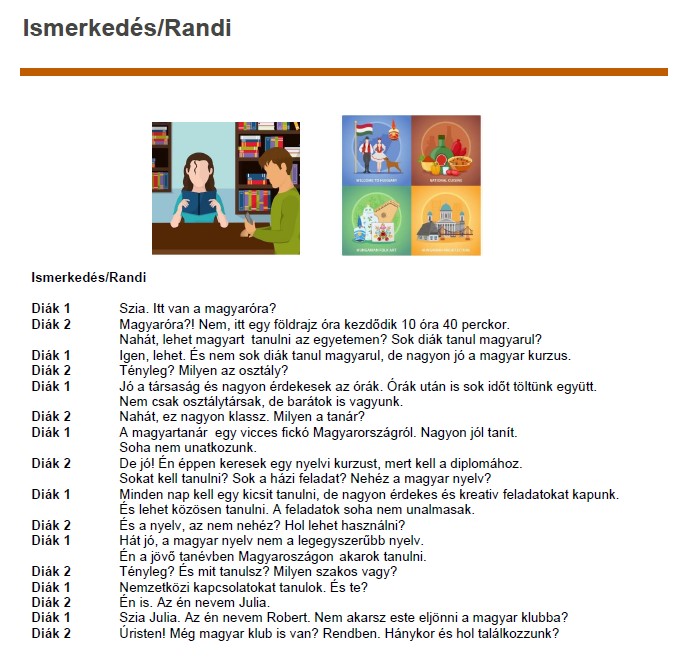Chapter 8 – Part 2 – Ismerkedés/Randi

Pronunciation warm up
Intonation
Vocabulary – Practice the pronunciation of the following words
Random words – 2
Keep in mind: stress is always placed on the first syllable of a word.
Reading – Read the text and learn the new vocabulary

Note: question sentences, possessive structure, infinitive, prefix verbs
Listening
audio/video – TBA
Dictation
Ismerkedés/Randi
Reading – Read the text and learn the new vocabulary
Ismerkedés/Randi Diák 1 Szia. Itt van a magyaróra? Diák 2 Magyaróra?! Nem, itt egy földrajz óra kezdődik 10 óra 40 perckor. Nahát, lehet magyart tanulni az egyetemen? Sok diák tanul magyarul? Diák 1 Igen, lehet. És nem sok diák tanul magyarul, de nagyon jó a magyar kurzus. Diák 2 Tényleg? Milyen az osztály? Diák 1 Jó a társaság és nagyon érdekesek az órák. Órák után is sok időt töltünk együtt. Nem csak osztálytársak, de barátok is vagyunk. Diák 2 Nahát, ez nagyon klassz. Milyen a tanár? Diák 1 A magyartanár egy vicces fickó Magyarországról. Nagyon jól tanít. Soha nem unatkozunk. Diák 2 De jó! Én éppen keresek egy nyelvi kurzust, mert kell a diplomához. Sokat kell tanulni? Sok a házi feladat? Nehéz a magyar nyelv? Diák 1 Minden nap kell egy kicsit tanulni, de nagyon érdekes és kreativ feladatokat kapunk. És lehet közösen tanulni. A feladatok soha nem unalmasak. Diák 2 És a nyelv, az nem nehéz? Hol lehet használni? Diák 1 Hát jó, a magyar nyelv nem a legegyszerűbb nyelv. Én a jövő tanévben Magyaroszágon akarok tanulni. Diák 2 Tényleg? És mit milyen szakos vagy? Diák 1 Nemzetközi kapcsolatokat tanulok. És te? Diák 2 Én is. Az én nevem Julia. Diák 1 Szia Julia. Az én nevem Robert. Nem akarsz este eljönni a magyar klubba? Diák 2 Úristen! Még magyar klub is van? Rendben. Hánykor és hol találkozzunk?
Practice exercises
1. True or false
2. Create question sentences
3. Find the mistakes
4. Listen to the audio and create sentences
Grammar Bites
1. TIME ENDING “-KOR”
Mikor? [When? At what time?] – The suffix -kor expresses point of time and it is usually translated in English by the preposition “at”
| két órakor | at 2 am/pm |
| kettőkor | at 2 am/pm |
| 2 óra 30 perckor | at 2.30 am/pm |
2. TIME ENDING “-IG”
Meddig? [Till where? Till when? How long?] – The suffix -ig expresses the adverb of place and time.
| Place | Londontól Budapestig. | From London to Budapest. |
| Time-1 | Reggeltől estig. | From morning till evening. |
| Time-2 | Egy évig várok. | I am waiting for a year. |
3. IRROGATIVE PARTICLE “-E”
The English conjunction “whether” or “if” in the indirect question is translated in Hungarian by the interrogative particle -e attached to the verbal or nominal predicate (in writing it is always separated by a hyphen)
| Akartok-e ma este vendégeket hívni? | Do you (really) want to invite guests tonight? |
| Megyünk-e ma étterembe? | (Whether) Are we going to go to the restaurant today? |
4. FORMATIVE SUFFIX “-ÉK”
The suffix “-ék” is attached to names of persons and professions, but denotes somebody’s family and corresponds to the English “-s” or people (=family)
| Feketéék | Fekete – the Feketes – the Fekete family |
| Lászlóék |
László and László and his friends or people |
Did you know? – Culture Corner
A mai magyar nyelv
The modern Hungarian language ( including vocabulary and grammar rules) today is the result of the late 18th-century language reform/renewal movement. During this reform period, more than ten thousand words were produced, many of which remain in active use today. The reforms contributed to the installment of Hungarian as the official language over Latin in the country on November 13, 1844. This day became the “Day of the Hungarian Language” in 2011.
date
geography
(it) begins, starts
so
is it possible?
course
group, company
after classes
we spend time
cool
guy
never
we get bored
i am looking for
language course
to the diploma (graduation)
we get, receive
together
exercises
difficult
to use
the simplest
what is your major?
i am studying international relations
don't you want to come tonight?
omg
what time?
